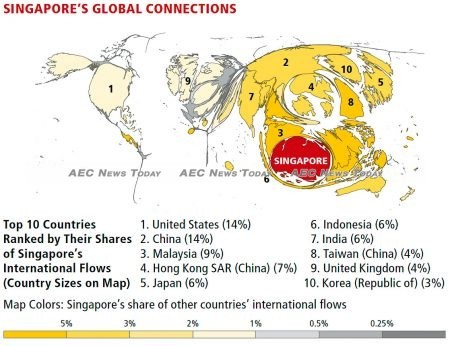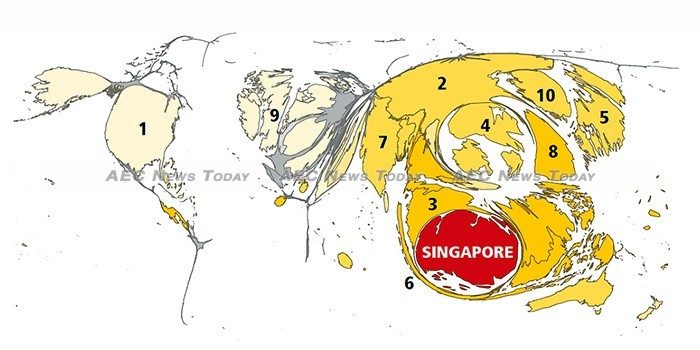Although Singapore remains the undisputed business hub of Asean a recently released international trade connectivity survey also found rapid improvements in other Asean member states.
Cambodia, Malaysia, Singapore, and Vietnam (along with Mozambique) were highlighted in notes accompanying the latest DHL Global Connectedness Index (GCI 2019) as the five countries globally where international flows were exceeding expectations, while Myanmar saw its ranking rocket 24 places to 133.
The report, commissioned by global logistics company DHL and produced by the New York University Stern School of Business and the IESE Business School, draws on more than three million data points from international flows covering trade, capital, information, and people.
Now in its fifth edition, the GCI 2019 assesses developments in globalisation across 169 countries and territories, which jointly account for 99 per cent of the world’s GDP and 97 per cent of its population.
The 2019 Index is particularly poignant, being the first comprehensive assessment of developments in globalisation produced in the wake of the Brexit referendum in the United Kingdom and the 2016 presidential election in the United States.
While eight of the top 10 most connected countries are located in Europe, Asean member countries are generally moving in the right direction.
Thailand 25th globally

Ranking second in the region and 25 globally, Thailand occupies the same position in the GCI 2019 as it did in the last report, five places above the United States and eight places above Australia.
Fellow regional manufacturing hub Vietnam is Asean’s third most connected business centre, despite tumbling three places over last year’s report to 39th globally this year.
Leaping up the connectivity tables four places each is Cambodia and the Philippines, the former ranking 49th globally and the latter 52nd, both well above China which ranked 61 globally, dropping one place from the previous GCI.
Also slipping down the latest connectivity index was Indonesia, which plummeted nine places to rank 111 globally, while Lao PDR remained the regions most poorly connected business centre at 149, despite rising four places over its past rank.
CPTPP, RCEP to drive regional connectivity
Christopher Ong, managing director of DHL Express Singapore said, “global trade pacts including the Comprehensive and Progressive Agreement for Trans-Pacific Partnership (CPTPP) and the proposed Regional Comprehensive Economic Partnership (RCEP), which is expected to be concluded this year, are also likely to help increase Asean’s trade connectedness and economic integration moving forward”.
Locally he said “Singapore is expected to benefit from the continued implementation of initiatives set forth in the Asean Master Plan on Connectivity 2025, which aim to improve logistics, harmonize regulations, reduce non-tariff barriers and improve mobility of people.
“This includes the Asean Single Window, which will expedite cargo clearance and promote Asean economic integration by enabling the electronic exchange of trade-related documents among Asean member states”, he added.

Delivering the 2019 Singapore Budget on February 19, Singapore Finance Minister Heng Swee Keat announced plans by the government to build Singapore’s position as a Global-Asia Node of technology, innovation, and enterprise, in parallel with its adoption of the Fourth Industrial Revolution (4IR).
The plan aims to promote Singapore as “Asia 101” for global multinational companies (MNCs) looking to expand into Asia’s growing markets, and as “Global 101” for Asian companies ready to go global.
In pursuit of this the Singapore government has set aside S$19 billion (about US$14.069 bln) as part of its five-year Research, Innovation, and Enterprise 2020 plan.
As one of the world’s most open and connected economies, Singapore would appear to be well on its way of becoming the regions first Global-Asia Node (Gan).
See here to download the full 2019 DHL Global Connectedness Index
Feature photo DHL
Related:
- Singapore loses out to Netherlands as world’s most connected country: report (Singapore Business Review)
- DHL Express named Asia Pacific’s best employer for fifth consecutive year (Viet Nam News)
- DHL Express names Christopher Ong as its new Singapore MD (Business Times)
She commenced as an intern at AEC News Today and was appointed as a junior writer/ trainee journalist on April 2, 2018
Latest posts by Sreypov Men (see all)
- Myanmar morning news for July 24 – July 24, 2020
- Vietnam morning news for July 24 – July 24, 2020
- Malaysia morning news for July 24 – July 24, 2020
- Myanmar morning news for July 23 – July 23, 2020


